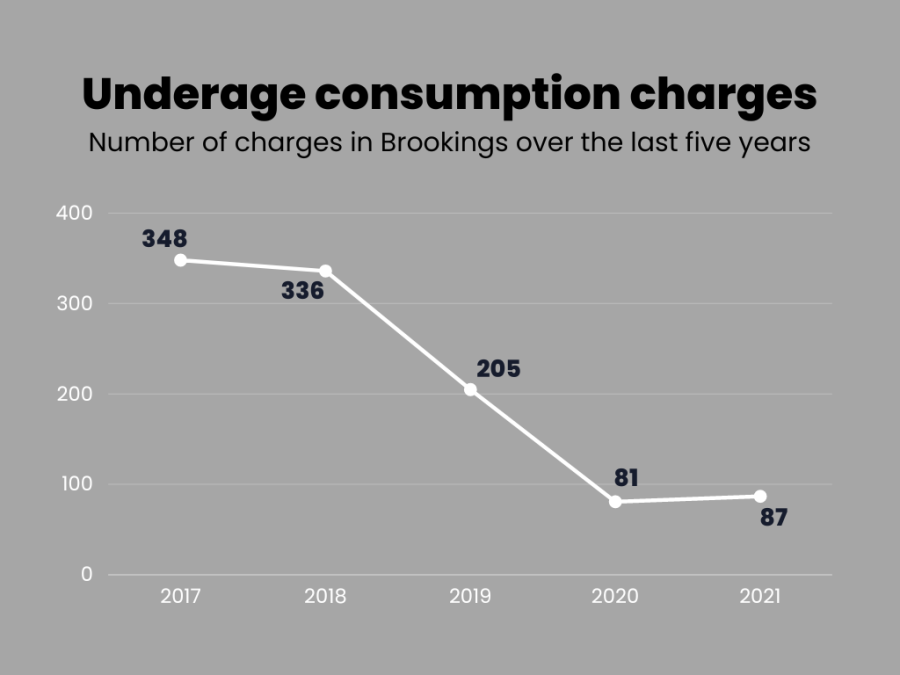Youth diversion program lowers underage charges
Collegian graphic by MARA WHEATON (She/Her)
Underage consumption charges dropped by over 250 since the start of the Brookings Youth Diversion Program in 2017.
February 28, 2023
The Brookings Youth Diversion Program has helped over 500 students expunge minors off their records since the program started four years ago.
The program is an opportunity for students to get underage drinking citations off their records. Dan Nelson, the Brookings County states’ attorney, started the program to give students a second chance rather than just charging them with a crime.
“I thought we could set them up for success rather than failure,” Nelson said. “But also do it in a way that still holds them accountable.”
The program requires students to do 10 hours of community service and a 3-hour class in a 30-day period to get the charge dismissed. Students must also stay crime free for 13 months to then get the arrest expunged from their record.
As of 2021, there were four times fewer cases of underage consumption than when the program started in 2017 which reported 348 minors. The amount decreased over the years from 336 in 2016, 205 in 2019, 81 in 2020 and 87 in 2021, according to data from Brookings County states’ attorney office.
Over 5,000 community service hours have come out of this program. Students can do their community service hours at various places around Brookings like United Way, Humane Society and the Great After-School Place (GAP).
Heidi Gullickson, executive director of United Way, said in 2022 they had over 275 hours of community service from diversion students. Students help clean new buildings, hang up posters around town, put together care packages and other projects.
“It helps them out to focus on programming and fundraising,” Gullickson said. “Diversion students help [nonprofits] get stuff done faster.”
The program has made a positive impact and response from the community since it started. Nelson said he has seen more SDSU students get engaged in the community through this program. It has allowed students to give back to the community, which has built the relationship between Brookings and SDSU, according to Nelson.
“These are successful college students that got caught drinking underage, so these kids are very welcomed by these nonprofits,” he said.
Gullickson said all the students who have helped at United Way have been wonderful, respectful volunteers. She said many of the students come back after their community service hours to volunteer again at these nonprofits.
“It opens their eyes on how they can make an impact while getting their education,” she said.
The program is entirely funded through participants. The cost is $120, which is sent to The Ivy Center- Brookings Behavioral Health and Wellness. Well over $50,000 has been sent to the center from this program.
“Since they’re a nonprofit, that’s obviously a really big deal,” Nelson said. “We want to make sure we are funding the mental health providers in our community.”
Nelson said he sees a successful future for this program. He thinks more community stakeholders will get involved to make this program better and as the university continues to grow, more students will go through the program.
“It certainly has been successful, and I think it will continue to be successful in the future,” Nelson said.
There is a similar program offered in Brookings for marijuana charges. Students who participate in this program must also take class but must complete 20 hours of community service.
Students learn about and get the opportunity to take these programs at their court dates for their charges. Gullickson said she thinks this program gives students a second chance and encourages them to use it.
“We are thankful to be able to be a part of the program and appreciate the help students have been able to give us,” she said
























